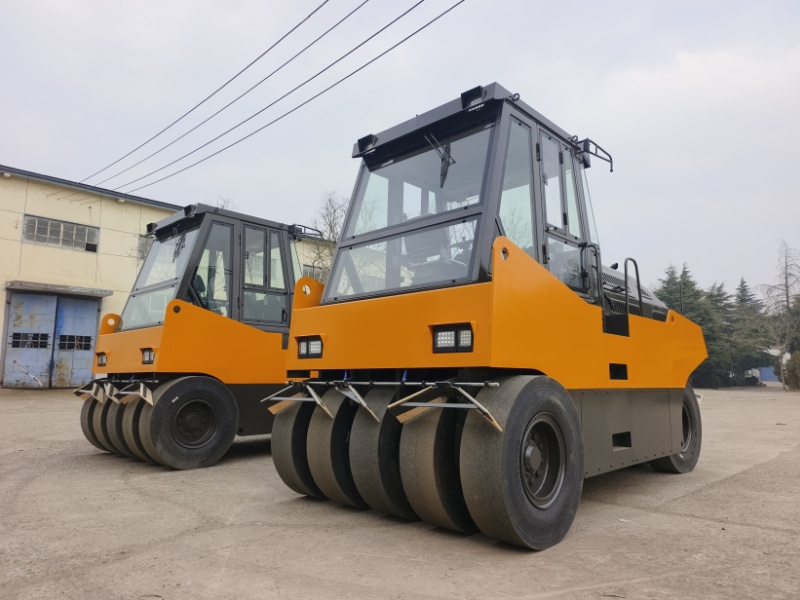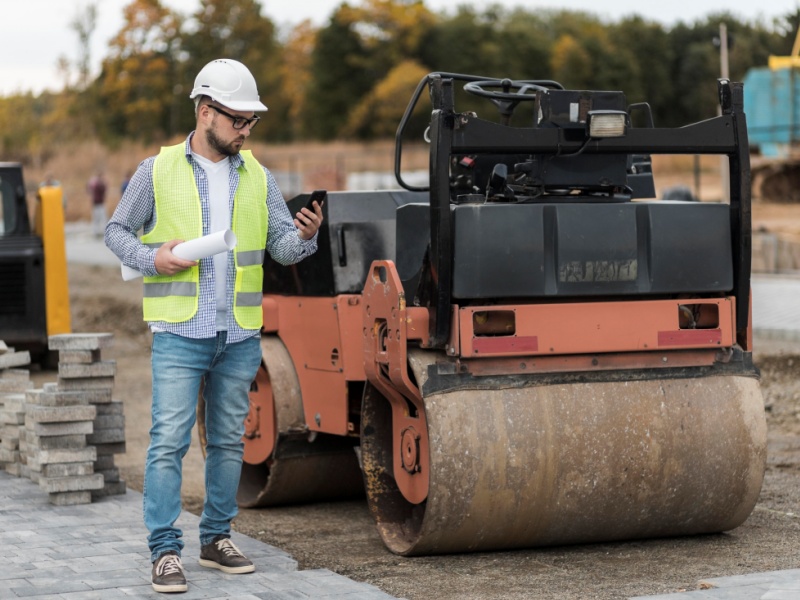So verlängern Sie die Lebensdauer Ihres Verdichters
Oct 06, 2025
I. Einleitung: So verlängern Sie die Lebensdauer und steigern die Leistung Ihrer VerdichtungsgeräteWalzen sind unverzichtbare Arbeitstiere im Straßenbau, auf Flughafenpisten, im Fundamentbau und bei kommunalen Bauprojekten und bewältigen hochintensive Verdichtungsaufgaben. Sie arbeiten häufig unter hoher Belastung und sind oft widrigen Bedingungen wie Staub, hohen Temperaturen oder Feuchtigkeit ausgesetzt.Diese Kombination aus häufigem Betrieb und rauen Umgebungsbedingungen führt dazu, dass Verdichter ohne wissenschaftliche Wartung und korrekte Bedienung sehr anfällig für vorzeitigen Verschleiß, Leistungsverschlechterung oder größere Ausfälle sind. II. Die wichtigsten Verschleißpunkte Ihres Verdichters verstehenFür eine effektive Wartung Ihres Verdichters müssen Sie zunächst seine wichtigsten Komponenten und die gängigen Verschleißteile kennen:Kernsysteme: Das Vibrationssystem, die Trommel, das Hydrauliksystem und der Motor.Die Verschleißpunkte variieren je nach Betriebsbedingungen:Verdichtung von Erdmaterial: Die Trommel und die Vibrationslager sind hochfrequenten Stoßbelastungen ausgesetzt und stellen daher die Hauptverschleißpunkte dar.Asphaltverdichtung: Das Hydrauliksystem arbeitet über längere Zeiträume unter hoher Last, was leicht zu einer Erhöhung der Öltemperatur und zur Alterung von Dichtungen und Hydraulikflüssigkeit führt. Schwerpunkt: Die Einführung eines regelmäßigen Inspektionsplans, der sich speziell auf diese Kernkomponenten konzentriert, ermöglicht es den Betreibern, potenzielle Probleme frühzeitig zu erkennen und zu verhindern, dass sich kleinere Fehler zu kostspieligen Ausfällen ausweiten. III. Checkliste für die tägliche Wartung1. Reinigung und InspektionReinigung nach dem Betrieb: Reinigen Sie nach jeder Schicht die Trommeloberfläche und das Maschinengehäuse gründlich von angesammeltem Schmutz, Asphalt oder Ablagerungen, um Probleme mit der Wärmeableitung oder Metallkorrosion zu vermeiden.Regelmäßige Kontrollen: Überprüfen Sie alle Befestigungsschrauben auf festen Sitz, die Hydraulikleitungen auf Undichtigkeiten, kontrollieren Sie die Ölstände (Motoröl, Hydraulikflüssigkeit) und achten Sie auf Anzeichen von Alterung an den Dichtungen.2. Schmierung und WartungPlanmäßiger Austausch: Halten Sie sich strikt an die Anweisungen des Herstellers bezüglich des rechtzeitigen Austauschs von Schmieröl, Hydraulikflüssigkeit und verschiedenen Filterelementen (basierend auf der Zeit oder den Betriebsstunden). Hochwertige Schmierung: Verwenden Sie ausschließlich die vom Gerätehersteller empfohlene Schmierstoffmarke. Mischen Sie niemals verschiedene Ölsorten, um eine optimale Schmierleistung und Systemkompatibilität zu gewährleisten. 3.Geplante WartungszyklenWartungszyklusEmpfohlene PrüfpunkteTäglichPrüfen Sie alle Flüssigkeitsstände, Trommelabstreifer, Armaturenbrettanzeigen und Befestigungselemente.WöchentlichÜberprüfen Sie die Schmierung der Lager des Vibrationssystems, den Reifendruck (falls zutreffend) und reinigen Sie den Luftfilter.Monatlich/250 StundenMotoröl und Ölfilter wechseln, Hydrauliksystemdruck und Flüssigkeitsreinheit prüfen.Wichtiger Hinweis: Die regelmäßige professionelle Überprüfung des Vibrationssystems und der elektrischen Anlage hilft, versteckte Schäden aufzudecken, die mit bloßem Auge nicht sichtbar sind. IV. Die Bedeutung korrekter ArbeitsgewohnheitenGute Betriebsgewohnheiten tragen mehr zur Langlebigkeit einer Maschine bei als häufige Reparaturen.Vor dem Start: Vor der Inbetriebnahme Motor und Hydrauliksystem auf Betriebstemperatur bringen, insbesondere bei kaltem Wetter, um empfindliche Bauteile zu schützen.Punktuelle Vibrationen vermeiden: Vermeiden Sie während der Bauarbeiten anhaltende Vibrationen an derselben Stelle über längere Zeiträume, da dies zu unnötigen strukturellen Schäden und Spannungskonzentrationen an der Trommel und am Fundament führen kann.Sicherheitsbetrieb: Betreiben Sie das Fahrzeug niemals mit Überlastung und versuchen Sie nicht, mit hoher Geschwindigkeit auf unebenen oder steilen Hängen zu rollen.Anpassungsbedingungen: Wählen Sie die geeignete Vibrationsfrequenz und das passende Getriebe genau nach der für das Projekt erforderlichen Verdichtungsdichte aus, um eine hohe Effizienz und einen geringen Verbrauch zu gewährleisten.V. Arbeitsumgebung und Lagerbedingungen Die Umgebung, in der die Geräte verwendet und gelagert werden, beeinflusst auch direkt ihre Lebensdauer:Temperaturkontrolle: Vermeiden Sie einen längeren Dauerbetrieb bei extrem hohen oder niedrigen Temperaturen. Sorgen Sie bei Bedarf für Beschattung oder Isolierung.Lagerungshinweise: Während der Regenzeit oder Baupausen sollten die Geräte in einem gut belüfteten, trockenen Innenraum oder unter einem Schuppen gelagert werden, um Korrosion durch Regen und Feuchtigkeitsschäden an den elektronischen Bauteilen zu vermeiden.Regelmäßiger Start: Auch bei längerer Lagerung sollte die Maschine in regelmäßigen Abständen (z. B. monatlich) gestartet und einige Minuten lang laufen gelassen werden, um eine Entladung der Batterie und Verstopfungen im Kraftstoff- und Hydrauliksystem zu vermeiden. Fazit: Mit der richtigen Pflege kann die Lebenserwartung verdoppelt werden.Die wichtigsten Prinzipien zur Verlängerung der Lebensdauer Ihrer Verdichter lassen sich in vier Kernelemente zusammenfassen: Wissenschaftliche Wartung, korrekte Bedienung, optimale Umgebungsbedingungen und hochwertige Ersatzteile. Die Priorisierung des Lebenszyklusmanagements von Anlagen gewährleistet nicht nur die Projektqualität, sondern ist auch eine entscheidende Strategie für Unternehmen, um Kosten zu kontrollieren und eine nachhaltige Entwicklung zu erreichen.Die Wachstumswelle in den Schwellenländern hat begonnen, und die Hersteller von Baumaschinen müssen sich auf intelligente, umweltfreundliche Komplettlösungen konzentrieren, um sich im neuen globalen Umfeld einen Wettbewerbsvorteil zu sichern. Entdecken Sie die gesamte Produktpalette an Verdichtern und den Kundendienst von LTMG, damit Ihre Maschinen länger und leistungsstärker laufen.“

